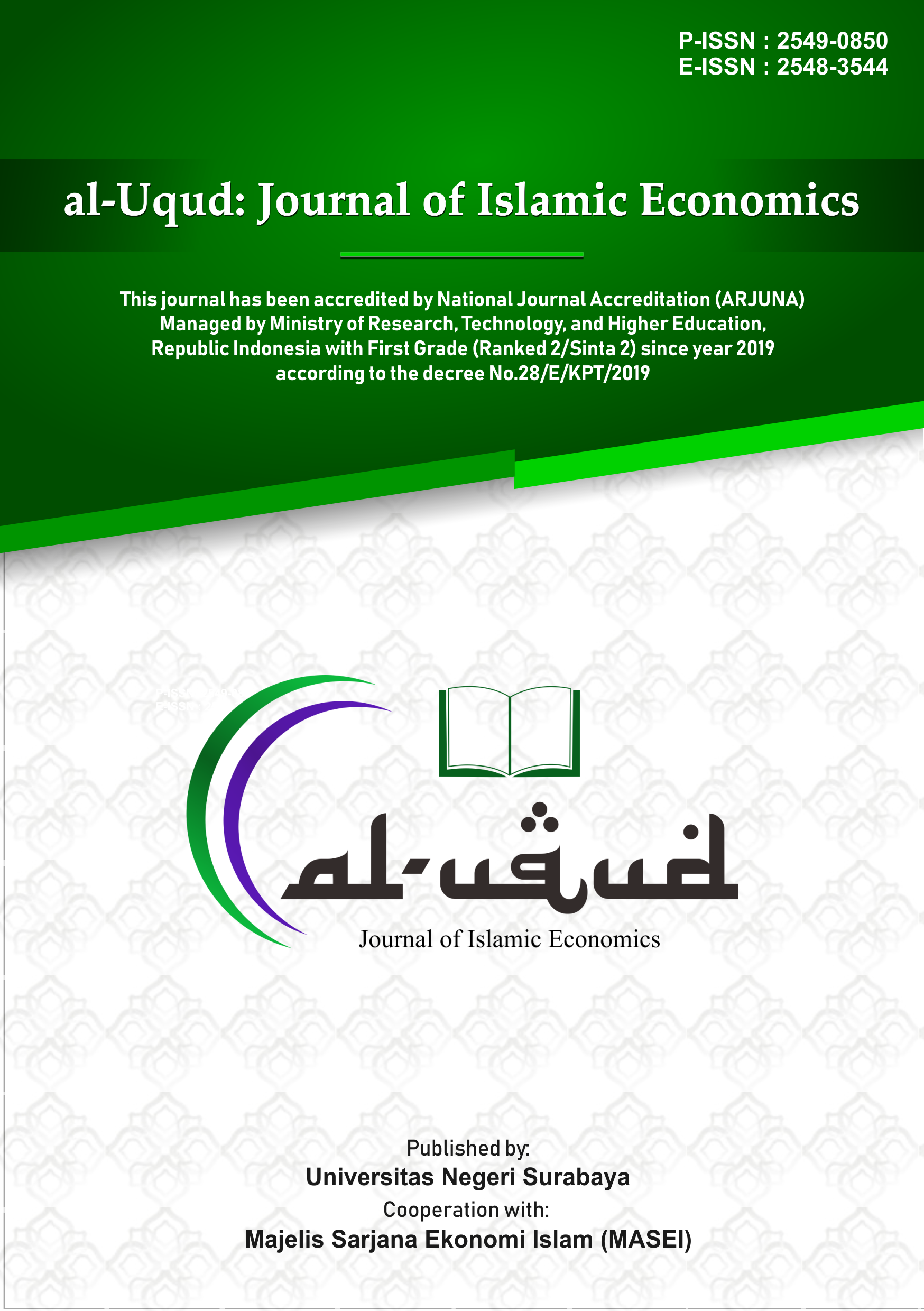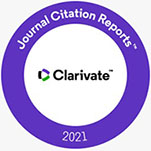PATRONAGE OF ISLAMIC AND CONVENTIONAL BANKS: THE CASE OF SYRIA
DOI:
https://doi.org/10.26740/al-uqud.v3n2.p98-113Keywords:
Patronage, Islamic banks, Conventional banks, SyriaAbstract
The aim of this study is to understand perception of conventional banks customers towards Islamic banking by examining their level of awareness about Islamic banking. The qualitative approach was used in the form of semi-structured interviews under the phenomenological approach in Damascus city. The main findings of this research are customers lack awareness of Islamic banking operations. Furthermore, Islamic banks stuff play a crucial rule to enhance awareness and willingness towards their services. This study revealed that an informative advertising campaign is highly recommended to raise the awareness level among Syrians towards Islamic banking. Moreover, Islamic banks should be more selective especially when they recruit customer service operation staff. This research is a pioneering attempt towards Islamic banking issues in the case of Syria from a customer perspective. It contributes to the Syrian perceptions towards Islamic banking literature.
References
Al-Jafari, M. K., and Alchami, M. 2014. Determinants of bank profitability: Evidence from Syria. Journal of Applied Finance & Banking, Vol 4 No.1: 17-45.
Al-Salem, F. H. 2009. Islamic financial product innovation. International Journal of Islamic and Middle Eastern Finance and Management, Vol. 2 No.3: 187-200.
Al-Sultan, W. 1999. Financial characteristics of interest-free banks and conventional banks. PhD dissertation, University of Wollongong, Wollongong.
Abduh, M., and Azmi Omar, M. 2012. Islamic banking and economic growth: The Indonesian experience. International Journal of Islamic and Middle Eastern Finance and Management, Vol5 No. 1, 35-47.
Asma, R. I.K. N. M., Naziman, S. S. J., Asari, F. F. A. H., Muhammad, N., Sabri, S. M., and Jusoff, K. 2011. Religious value as the main influencing factor to customers patronizing Islamic bank. World Applied Sciences Journal, Vol.12: 8-13.
Asutay, M. 2007. Conceptualisation of the second best solution in overcoming the social failur of Islamic finance: examining the overpowering of homoislamicus by homoeconomicus. IIUM Journal of Economics and Management, Vol. 15: 167-95.
Atmeh, M. A., and H. Ramadan, A. 2012. A critique on accounting for the mudarabah contract. Journal of Islamic Accounting and Business Research, Vol. 3 No.1, 7-19.
Bouslama, G. and Lahrichi, Y. 2017. Research in International Business and Finance Uncertainty and risk management from Islamic perspective. Research in International Business and Finance, Vol.39: 718-726.
Butt, I., Ahmad, N., Naveed, A. and Ahmed, Z. 2018. Determinants of low adoption of islamic banking in pakistan. Journal of Islamic Marketing, Vol. 9 No. 3: 655-672.
Cham, T. 2018. Determinants of Islamic banking growth: an empirical analysis. International Journal of Islamic and Middle Eastern Finance and Management, Vol. 11 No. 1: 18-39.
Cengiz, E., Erdener, K. and El-Bdour, R. 1990. Conventional and Islamic Banks: Patronage Behaviour of Jordanian Customers. International Journal of Bank Marketing, Vol. 8 No.4 : 25-35.
Central bank of Syria 2019. Legislations and Regulations, available at http://www.cb.gov.sy/en/legislations-laws/all (accessed 21 January 2019).
Djaghballou, C.E., Djaghballou, M., Larbani, M. and Mohamad, A. 2018. Efficiency and productivity performance of zakat funds in Algeria. International Journal of Islamic and Middle Eastern Finance and Management, Vol11 No.3: 474-494.
Dusuki, A.W. and Abdullah, N. I. 2007. Why do Malaysian customers patronise Islamic banks?. International Journal of Bank Marketing, Vol.25 No.3: 142-160.
Echchabi, A. and Abd. Aziz, H. 2014. Shariah issues in Islamic banking: a qualitative survey in Malaysia. Qualitative Research in Financial Markets, 6 (2):198-210.
Farikhah, K. and Rani, L. N 2019. Determinants Of Profitability Of Sharia Regional Development Banks In Indonesia 2014-2017. Al-Uqud: Journal of Islamic Economics, Vol. 3 No 1, 1-17.
Gerrard, P. and Cunningham, B. 1997. Islamic banking: a study in Singapore. International Journal of Bank Marketing, Vol15 No.6:204-216.
Hamid, A.H. and Nordin, N.Z. 2001. A Study on Islamic Banking Education and Strategy for the new Millennium Malaysian Experience. International Journal of Islamic FinancialService. Vol.2 No.4: 3-11.
Islam, J.U. and Rahman, Z. 2017. Awareness and willingness towards Islamic banking among Muslims: An Indian perspective. International Journal of Islamic and Middle Eastern Finance and mangement, Vol.10 No.1: 92-101.
Kamarulzaman, Y. and Madun, A. 2013. Marketing Islamic banking products: Malaysian perspective. Business Strategy Series, Vol.14 No.3: 60-66.
Koenigstorfer, J. and Klein, A.G. 2010. Examining the use of nutrition labelling with photoelicitation. Qualitative Market Research: An International Journal, Vol13 No.4: 389-413.
Merriam, S.B. 2009. Qualitative Research: A Guide to Design and Implementation. Jossey Bass, San Francisco: CA.
Mohamad, M. j. 2015. use the financial analysis tools to evaluate the performance of islamic vs conventional banks in syria (2007-2014). Unpublished Master thesis, Damascus university, Damascus.
Muhammad,T.M., Abida Z., 2017. How Islamic is Islamic banking in Pakistan?, International Journal of Islamic and Middle Eastern Finance and Management, Vol. 10 No.4, pp.470-483
Nik Abdul Ghani, N.A.R. 2018. Beneficial ownership in sukuk ijarah: a shariah appraisal. International Journal of Islamic and Middle Eastern Finance and Management, Vol.11 No.1: 2-17.
Omer, H. 1992. The implication of Islamic beliefs and practice on Islamic financial institutions in the UK. PhD dissertation, Loughborough University, Loughborough.
Rammal, H. and Zurbruegg, R. 2006. Awareness of Islamic banking products among Muslims: thecase of Australia. Journal of Financial Services Marketing, Vol.12: 65-74.
Rassool, N.H. 2018. Towards establishing an Islamic retail bank in a Muslim-minority country: Prospects and challenges in Mauritius. ISRA International Journal of Islamic Finance, Vol.10 No.1 :78-84.
Slam, J.U. and Rahman, Z. 2017. Awareness and willingness towards Islamic banking among Muslims: An Indian perspective. International Journal of Islamic and Middle Eastern Finance and Management, Vol10 No.1: 92-101.
Sulaiman .L., Mustafa, O. M., Rusni. B. T., Umar. A. O. 2016.The feasibilityof adopting Islamic Banking system under the existing laws in Uganda. International Journalof Islamic and Middle Eastern Finance and Management, Vol.9 No.3: 417-434.
Tijani, B., Fifield, S.G.M. and Power, D.M. 2009. The appraisal of equity investments by Nigerian investors. Qualitative Research in Financial Markets, Vol.1 No.1: 6-26.
Downloads
Published
How to Cite
Issue
Section
License
CC BY 4.0 Abstract views: 1411
,
Abstract views: 1411
, PDF Downloads: 618
PDF Downloads: 618








